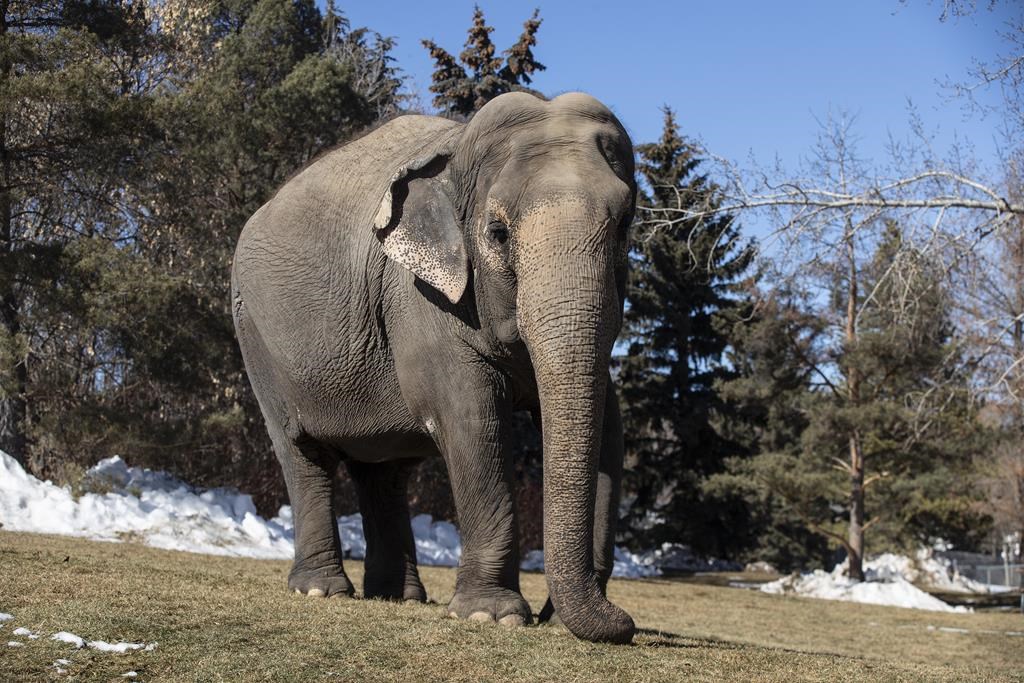New bill seeks to limit new captivity of elephants, apes in Canada

Posted November 24, 2023 12:04 pm.
A Saskatchewan senator hopes new legislation now before Canada’s Parliament will be the beginning of the end for the practice of putting elephants in captivity in Canada.
Sen. Marty Klyne said it will also offer some of “the strongest legal protection in the world” to great apes, including gorillas, chimpanzees, orangutans and bonobos.
Bill S-15, introduced in the Senate this week, would prohibit new captivity of elephants and great apes, including for breeding, without a licence that shows it is for conservation, science or the animal’s welfare.
“In many ways, these remarkable creatures are very much like us,” Klyne said in the Senate on Thursday as debate began on the bill.
He said they are self-aware, highly intelligent, emotional and social animals who have advanced communication skills.
“Yet in Canada, possession of these creatures does not require a licence or a justifiable purpose,” he said.
Klyne said Bill S-15 does ban any elephants or great apes from being used for entertainment purposes, but does not explicitly outlaw their use in ride-on attractions.
It is something he said could be proposed as an amendment, though such rides disappeared in Canada four years ago after a handler was injured by an elephant in a ride-on exhibit at the African Lion Safari near Hamilton.
Elephant rides were barred in 2021 by Canada’s Accredited Zoos and Aquariums, a charitable organization known as CAZA that provides some oversight to zoos that voluntarily seek its accreditation.
The Canadian Press sought CAZA’s reaction to the new bill but has not received a response yet.
Several of its accredited zoos, including Zoo de Granby in Quebec, the Toronto Zoo and the Calgary Zoo, threw their support behind similar legislation that Klyne introduced as a private member’s bill in 2022.
That bill passed second reading in the Senate in June, and is now being studied by committee.
Beyond outlawing new captivity for elephants and apes, it would extend similar protections to other animals, including big cats, which are prominent features of roadside zoos. More than 4,000 big cats, such as cheetahs and tigers, are owned privately in Canada.
Klyne’s bill is nicknamed the Jane Goodall Act, after the famous primatologist who has dedicated her life to protecting primates around the world and agreed to lend her name to the legislation.
Klyne wants that bill passed, too, because it goes further. But because Bill S-15 is a government bill, it will get priority time for debate and is more likely to get through to a final vote.
Under the provisions in the government bill, licences can be granted for new elephants and apes to be held captive in Canada, but Klyne said he hopes none are ever issued for elephants, because no science has shown any benefit to having them in captivity, which causes lower birth rates and high death rates.
“Based on the recommendations of independent scientists and other experts, my view is that licences should not be granted for new elephant captivity in Canada,” he said.
Many Canadian zoos have relocated or promised to relocate their elephants, but 23 remain in captivity in Canada. All but six are at the African Lion Safari.
Klyne said he’d like to see all of them relocated to warmer climates.
There are more than 30 great apes in captivity, including rescued chimpanzees at the Fauna Sanctuary in Carignan, Que., south of Montreal, orangutans and gorillas at the Toronto Zoo and gorillas at the Zoo de Granby and Calgary Zoo.
Klyne noted the significant benefit of positive zoo conservation programs that aim to restore populations of great apes, which are critically endangered in the wild.
“Excellent zoos are helping to save endangered species in Canada and around the world, including great apes, and in doing so, they have my full support,” he said.
The Fauna Sanctuary’s descriptions of its six current chimpanzees paint a picture of highly intelligent creatures with unique personalities.
Binky, a 34-year-old chimp who was born in a research lab in New York state, hates to get dirty and loves throwing onions. Sue Ellen, the 56-year-old Fauna matriarch “loves to dress up like royalty” with scarves, necklaces and purses, and hates to be served with a straw.
World Animal Protection Canada welcomed the new bill this week, noting it builds on similar legislation that barred new captivity for whales and dolphins in 2019.
Wildlife campaign manager Michèle Hamers said the legislation recognizes the “use of these animals for entertainment is not acceptable anymore.”
The organization said it believes the bill can be strengthened, including when it comes to the protection of big cats in captivity.








